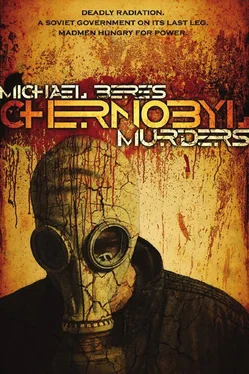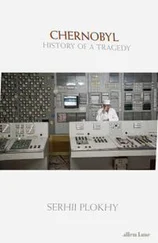Michael Beres - Chernobyl Murders
Здесь есть возможность читать онлайн «Michael Beres - Chernobyl Murders» весь текст электронной книги совершенно бесплатно (целиком полную версию без сокращений). В некоторых случаях можно слушать аудио, скачать через торрент в формате fb2 и присутствует краткое содержание. Жанр: Триллер, на английском языке. Описание произведения, (предисловие) а так же отзывы посетителей доступны на портале библиотеки ЛибКат.
- Название:Chernobyl Murders
- Автор:
- Жанр:
- Год:неизвестен
- ISBN:нет данных
- Рейтинг книги:4 / 5. Голосов: 1
-
Избранное:Добавить в избранное
- Отзывы:
-
Ваша оценка:
- 80
- 1
- 2
- 3
- 4
- 5
Chernobyl Murders: краткое содержание, описание и аннотация
Предлагаем к чтению аннотацию, описание, краткое содержание или предисловие (зависит от того, что написал сам автор книги «Chernobyl Murders»). Если вы не нашли необходимую информацию о книге — напишите в комментариях, мы постараемся отыскать её.
Chernobyl Murders — читать онлайн бесплатно полную книгу (весь текст) целиком
Ниже представлен текст книги, разбитый по страницам. Система сохранения места последней прочитанной страницы, позволяет с удобством читать онлайн бесплатно книгу «Chernobyl Murders», без необходимости каждый раз заново искать на чём Вы остановились. Поставьте закладку, и сможете в любой момент перейти на страницу, на которой закончили чтение.
Интервал:
Закладка:
Komarov left his window and returned to his desk. He placed a call to Major Dmitry Struyev, the only member of Directorate T in the Kiev office. Struyev was a trusted comrade, a so-called hard-liner. He was rarely in his office, but today he answered his phone.
“I am calling about a matter I brought up some time ago,” said Komarov.
“Proceed,” said Struyev, a man of few words.
“The American visiting Hungary has become a problem.”
“Gypsy Moth?”
“Yes,” said Komarov. “He has information critical to our nuclear program and is about to pass the information along. I need to be certain he does not.”
“I understand,” said Struyev. “Is there anything else?”
“No.”
They hung up without further comment. Komarov went back to his window and looked west. Somewhere beyond the Carpathians, Andrew Zukor would soon meet a man sent by Struyev. Whatever knowledge Zukor had would be gone, and the Chernobyl conspiracy would strengthen. As he stood at his window, Komarov felt the irony of his son, Dmitry, having the same name as the man he had just called.
Although Juli took precautions to limit her radiation exposure, she felt there was more she could have done. Instead of waiting to use the ladies’ room at the Hotel Dnieper to wash and change clothes, she should have used the ladies’ room earlier in the metro station.
Back in Pripyat, instead of going to see about Mihaly’s family, she should have stayed in the apartment.
As if he knew about the baby, Mihaly’s brother seemed anxious, taking time to call a hospital and arrange tests, driving her himself, and waiting for her. When the tests were completed, Lazlo came to her with a look of compassion.
“What did they say?” asked Lazlo.
“The counters showed nothing above normal. They took a blood sample. I’m supposed to call about the results tomorrow.”
“Did they give you anything?”
“Potassium iodide. It limits the amount of radioactive iodine in my system, especially my thyroid.”
She didn’t tell Lazlo the doctor who treated her gave her an extra dose of potassium iodide for the baby and recommended she consider an abortion.
Lazlo asked when she had eaten last. When she said twenty-four hours earlier, he took her to a nearby restaurant, where they ate thick borscht and pork sandwiches.
Lazlo wanted to know about her trip, about her plans. She gave details about the explosion Saturday morning, the precautions she and Marina had taken, the visit to Mihaly’s apartment, and the long wait before Vasily came for them on Sunday. She told him about Aunt Magda in Visenka. Lazlo said it was only a half-hour drive to the south, and he would take her.
“We fled south like war refugees,” said Juli. “Chernobyl workers and farmers alike. I heard people speaking Russian, Ukrainian, Slavic, and Hungarian. The voices seemed to come from another world.”
While Juli spoke, Lazlo stared at her. His eyes were dark and sincere, conveying a feeling of experience, knowledge, and gentleness.
A mature Mihaly, a man devoted to duty. His hair was graying but thick, and seemed windblown despite being inside the restaurant.
“We are in another world,” said Lazlo. “Mihaly once told me others at the plant considered Hungarians aloof. I remember when I was a boy having to learn Russian. I remember helping teach Russian to Mihaly. When it was time to move to Kiev, we had to learn Ukrainian. But we never lost touch with our first language. We spoke it whenever we were together.”
“I also remember learning languages,” said Juli. “My father taught me Hungarian while my mother taught me Russian. They fought over which language I should use. When I was a little girl, I used the two languages to pit my parents against one another, to get my way. It was only later, in Pripyat, when I began learning Ukrainian.”
“When was the last time you saw Mihaly?” asked Lazlo.
“Friday after work on the bus. He said he would be working on the shutdown.”
“What did he talk about?”
“The shutdown, the reasons for it.”
“Did he seem nervous?”
“Yes. He said it was dangerous doing the shutdown because of things recently going wrong. He spoke often of inadequate safety at the plant. It was a low-power experiment he didn’t think necessary… I didn’t expect this to happen… his wife and girls going to the plant… I feel responsible. I could have done something to prevent this. I failed. I…”
Lazlo touched her hand. “You can’t blame yourself for what fate brings.”
“I blame myself because Friday, when I spoke with Mihaly, I felt very selfish. I was the only person in the world who couldn’t have what she wanted. Mihaly was going back to his wife, and I was going back to loneliness. So now where is Mihaly? And where is his family?” Juli wiped her eyes with her table napkin. “Forgive me. I’m good at only weeping and messing with lives where I don’t belong.”
“Would you like to leave for your aunt’s now?”
“Yes.”
On the way out of the restaurant, several patrons looked at her sadly like those on the buses waiting to get into Kiev, but also like the faces on the bus taking Mihaly away Friday afternoon so long ago.
Before driving Juli to her aunt’s, Lazlo called headquarters. Deputy Chief Investigator Lysenko told him that personnel from the Ministry of Energy had joined the militia at the roadblocks and people were being measured with Geiger counters. Technicians sprayed those contaminated with a solution from tanker trucks.
“Who ordered this?” asked Lazlo.
“The Health Ministry,” said Lysenko. “In any case, you’re due back at the roadblock from Korosten tonight at midnight. The army is evacuating everyone from the area around Chernobyl, and Chief Investigator Chkalov has ordered double shifts.”
While driving out of Kiev, Lazlo turned on the radio for local news. Radio Moscow’s report was short, the commentator saying an accident had occurred at the Chernobyl nuclear facility north of Kiev, but everything possible was being done.
“Everything possible is being done,” commented Juli. “Which is absolutely nothing for all the people who sat in their homes not knowing about the radiation. I should have warned people. I should have gone from apartment to apartment.”
When he stopped at a traffic signal, Lazlo looked at Juli. She stared at him, and for an instant he felt a floating sensation, an insane moment when reality slips away to a parallel world created by a slight turn of events. In this parallel world, he marries Nina, and she sits beside him in coat and scarf. It was easy to imagine because Juli’s soft features and the green of her eyes reminded him of Nina, or of what Nina had secretly meant to him.
Juli continued staring at him. “I was selfish,” she said. “But perhaps I have reason. Last Friday night I was going to tell Mihaly… not to make him responsible… I was going to tell him… I was going away for several months… to have our baby.”
A car horn sounded from behind, and Lazlo drove on, feeling as though the entire universe had slipped a notch.
The Dnieper River bridge south of Trukhanov Island was sometimes referred to by citizens of Kiev as a bridge between two worlds.
On one side was Kiev, with its Monument of the Motherland and its hills and trees and architecture from earlier centuries when a structure was more than mere shelter. On the other side of the bridge was Darnitsa, set back beyond the river foliage on flatlands, its rectangular buildings like so many dominoes.
South out of Darnitsa along the eastern shore of the Dnieper, the hills across the river rose steeply. The river was wide, capturing the shadows of the hills. A passenger steamer heading south to the Black Sea added perspective to the picture postcard. As she watched the view out the car window, Juli imagined she was with the father of her future child on a holiday trip to Odessa and there was no such thing as radiation, or even atoms. Everything was solid and stable and would last forever.
Читать дальшеИнтервал:
Закладка:
Похожие книги на «Chernobyl Murders»
Представляем Вашему вниманию похожие книги на «Chernobyl Murders» списком для выбора. Мы отобрали схожую по названию и смыслу литературу в надежде предоставить читателям больше вариантов отыскать новые, интересные, ещё непрочитанные произведения.
Обсуждение, отзывы о книге «Chernobyl Murders» и просто собственные мнения читателей. Оставьте ваши комментарии, напишите, что Вы думаете о произведении, его смысле или главных героях. Укажите что конкретно понравилось, а что нет, и почему Вы так считаете.












